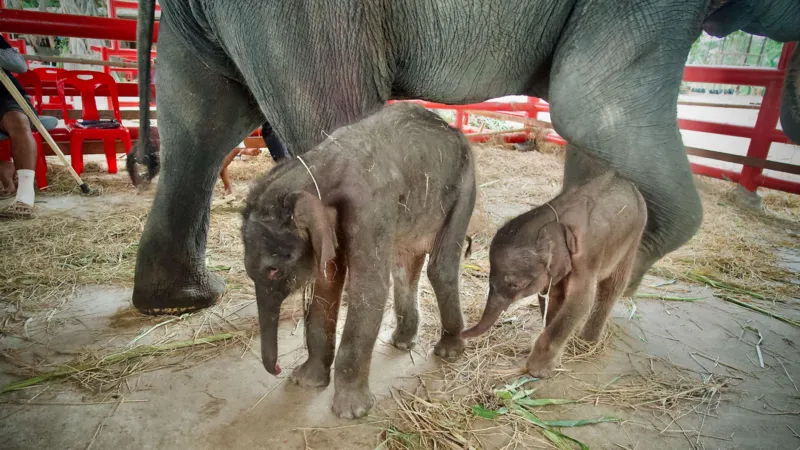In central Thailand, an Asian elephant has delivered an unusual set of twins, described by caretakers as a miracle.
The mother, 36-year-old Chamchuri, was not anticipated to give birth to twins. When she gave birth to a male calf last Friday, the staff at the Ayutthaya Elephant Palace and Royal Kraal assumed the delivery was complete.
However, as they were tending to the first calf, cleaning it and assisting it to stand, they heard a loud thud and realized that Chamchuri had also given birth to a second calf, a female.
The unexpected second birth caused the mother to panic, and caretakers had to restrain her to prevent her from harming the female calf. One caretaker sustained injuries in the process.
Dramatic footage circulated on social media depicted a group of caretakers, known as mahouts locally, urgently separating the female calf from the mother, with blood from the birth still visible on her hind legs.
According to Save the Elephants, a research organization, twins occur in only one percent of elephant births, and male-female twins are even rarer.
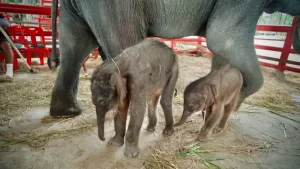
“Once we pulled the second baby elephant out, away from the mother, the baby stood up. We were all cheering because it’s a miracle,” veterinarian Lardthongtare Meepan told the BBC.
“We’ve always wanted to see elephant twins but not everyone can see this because it doesn’t happen a lot,” said Ms Meepan, who grew up at the elephant park, and is herself a mother of twins.
Charin Somwang, a 31-year-old mahout, broke his leg while restraining the mother.
“I was so happy, I couldn’t feel the pain,” he told the BBC, adding he felt the extent of the injuries only when he was brought to the hospital.
“It’s normal that the new mother will always try to kick or push the baby… I was afraid that she might break the baby elephant, so I put myself forward and tried to block the mother from the smaller one,” said Mr Somwang, who has been working at the park for 15 years.
In Thailand, elephants hold a sacred status, particularly in a predominantly Buddhist society, and they are revered as a national symbol.
Following the birth, the Ayutthaya Elephant Palace and Royal Kraal have showcased the twins through live streams on social media platforms.
Park visitors, including children, are permitted to view the twins, albeit after disinfecting their footwear and hands as a precautionary measure.
A sign near the nursery reads: “Please don’t touch the elephant babies”.
They will be named seven days after birth in accordance with Thai custom.
At 55kg (121lb) the female calf is slightly smaller than usual and has to step on a stool during feeding with her mother. Her brother is heavier at 60kg.
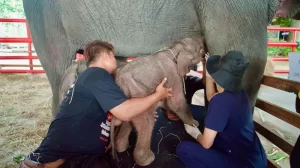
The park asserts that its elephants were rescued from street begging. In 1989, Thailand imposed a ban on logging in natural forests, resulting in mahouts, who were previously employed in that industry, being left unemployed.
This led them to resort to making elephants perform tricks for tourists in exchange for money. Although this practice was outlawed in 2010, there are still occasional instances of it occurring.
In Ayutthaya, Thailand’s former capital, some elephants transport tourists to temples and historic ruins by carrying them on their backs.
Conservationists oppose elephant riding, citing stress and abuse inflicted on the animals.
According to a previous report by the World Animal Protection (WAP), harsh methods are employed to train wild elephants to carry humans on their backs, a process known as “breaking-in” or “crush,” which typically begins shortly after capture.
Apart from Ayutthaya, elephants have also become attractions for tourists in highland villages in Chiang Rai and Chiang Mai in the north, where visitors can interact with them by feeding them bananas, going on walks with them, and bathing them in mud.
The Asian elephant is classified as an endangered species due to factors such as poaching, illegal trade, and habitat loss, as per the International Union for Conservation of Nature.
Thailand has more elephants used for tourism – over 3,000 – than any other country. Unlike captive populations in other nations, the majority of elephants in Thailand are privately owned.
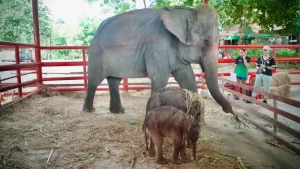
In contrast to their African counterparts, Asian elephants have smaller, rounded ears and hunched backs.
Meanwhile, visitors continue to visit the park in Ayutthaya eagerly awaiting the naming of the twin babies.
The twins stroll around a small pen covered with hay, occasionally rolling their trunks on their mother’s leg.
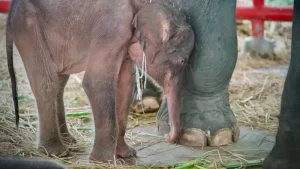
“I am always happy when I see elephant gives birth,” said Mr Somwang, their mahout who is recovering from injury.
“It doesn’t need to be twins. Elephant babies always bring joy,” he said.


